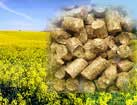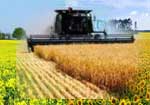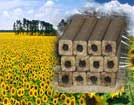






2. Pellets 8mm
3. 6-8 mm DIN+ Quality Pellets
4. We manufacture and sell fuel pellets from straw to European countries
5. Sell wood pellets
6. Wood pellet manufacturing
7. Sunflower Husk Pellets
8. Din Plus Wood Pellets
9. Export of sunflower husk pellets to the European market
10. Export of sunflower husk pellets to the European market
Small wood pellet fired biomass plant
Mon-14-2011Substituting electricity heating in private house in Denmark
The aim of this private project was for the Lambertsen family to decrease the heating costs in their new house. The house was electricity heated and the costs were 32,000 DKK. per year. However, a bill of approx. 7,500 DKK for 6 - 7 tonnes wood pellets per year substituted the electricity bill. This was possible by investing in a wood pellet plant and a central heating system in the house instead of the electric heaters.
Description
The house is approx. 160 m2 plus 135 m2 basement. The company Passat Energi delivered an 11 kW wood pellet boiler with wood pellet storage. It is a compact unit that does not take more room than an oil boiler. Also chimney and brand new radiators were installed. The fuel is a wood pellet, which automatically are stoked to the burner. The heat is transferred to the house via water in a central heating system and delivers the heat in the radiators. There is approx. 250 various type approved biomass boilers in Denmark and 30 manufacturers. The Lambertsen's received a list of these plants and then they consulted their chimney sweep. All the type approved boilers have a very high efficiency and low emission. Automatic boilers without accumulation should preferably have as low capacity as the peak heat demand -smaller if it is possible to supply with other heat sources a few days a year when you have the peak load. The boiler has the highest efficiency at high loads.
Results
The family is very happy for their choice of a Passat boiler, even though the choice could just as well have been another type-approved boiler. The main results of the project are that the family saves approx. 24,000 DKK per year in heating expenses. This means a CO2 reduction of approx. 32,000 kg a year for this plant - or 640 tonnes in a 20 year lifetime. It is easy to use pellets: Pellets are filled into the storage once a week and ash is to be removed 3 times a year. The combustion is automatic and controlled by a sensor measuring temperature and oxygen content in the flue.
Impact on the market
There are still many households using electricity and some with oil, who with advantage could convert into a biomass-fuelled plant with large CO2 reductions as a consequence. As in this case the economy could be very good for electricity heated houses, and for oil heated if the oil burner is worn out and they have to change the oil burner anyway. There are subsidies for such plants - and approx. 14,000 biomass fuelled plants have been installed and received the governmental subsidies since they were launched in 1995. The amount of the subsidy has decreased during the years in accordance with the success of the scheme. In 1995 the subsidy was 30% of the total investments whereas in 2001 it is max. 16% - and not for installation -costs and max. 5,000 DKK for private household (4,000 DKK for business/industry). So today the subsidy is not a large economic benefit but a good market driver. The cost savings are generally very good if the plant is installed in larger households, institutions, companies, etc. The environmental impact depends on the fuel being substituted - when it is electricity as in this case it is from 800 g - 1500g CO2/ kWh substituted by biomass.
The success is rather the increased efficiency of the boilers - which has led to decreased use of biomass for the same heating purposes - than increased consumption of biomass.
Project costs
Total price: 131,000 DKK. National subsidy of totally 37,000 DKK for exchange of electricity heating with central heating systems and for the biomass plant.
End price: 94,000 DKK. The family use approx. 6 - 7 tonne pellets a year substituting 32,000 kWh. Annual savings: 25.000DKK. Simple pay back time: 3,76 years.
Conclusions
This project indicates the success of the Danish small biomass boilers in private households and in small companies. One of the greatest successes for consumption of Danish wood fuels has been the subsidy programme and connected type approval system. This has led to increased efficiency and to approx. 2,600 small boilers being installed in private households or small institutions and companies per year from 1995 - 1999. A number, which in 2000 rose to 4,600 biomass, fuelled boilers, of which approx. 4,000 are for wood pellets. In 2001 6,000 biogas boilers are expected to be established. This systematic testing has thus given a boost to increased efficiency and reduction of emission.
Source: http://ukrfuel.com/news-small-wood-pellet-fired-biomass-plant-7.html
Any copying and distributing withoutactive hyperlink is strictly prohibited!
Views: 2566
 Stobart biomass division is to make a deal
Stobart biomass division is to make a deal
Biomass Related News
- Floating solar panels generating green energy
- Facilities of the municipality of Kiihtelysvaara, Finland heated by wood pellets
- Ikea starts selling solar panels through new ‘Solar Shops’
- Uses of wood charcoal
- Great changes in viability and profitability of solar power
- Greenleaf Power LLC is taking over Plainfield Renewable Energy
- The Valley (Pembrokeshire) Ltd is seeking full planning permission
- Refining Biomass in the Slovak Republic
- Solar panel new technologies bring high efficiency
- Market rooftop covered by 6,000 solar panels
|
© Ukrainian Biofuel Suppliers 2008-2024 |
